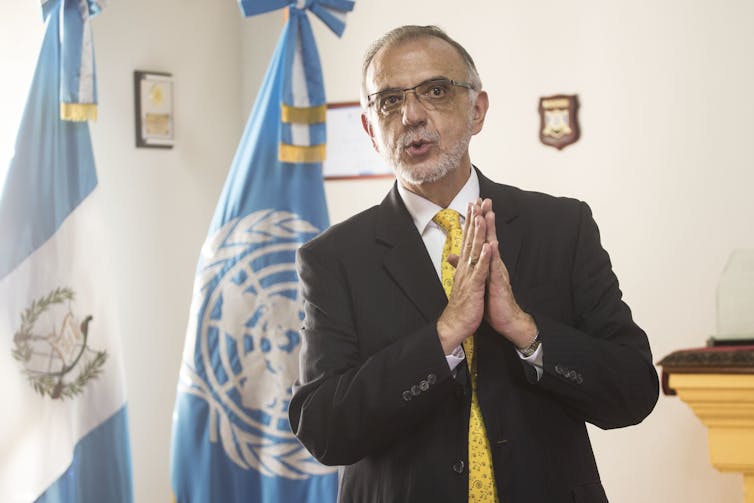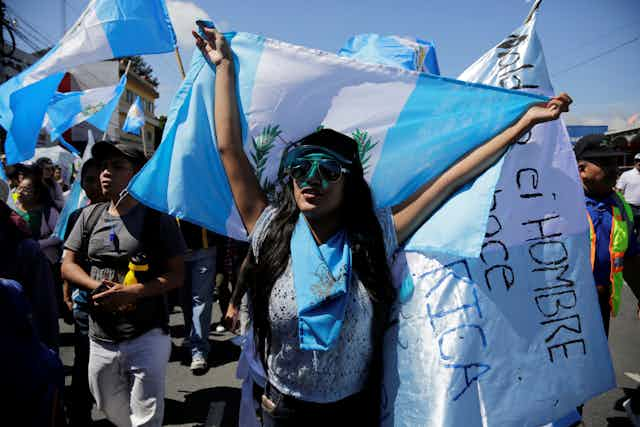Massive protests recently broke out in Guatemala as the nation teetered on the edge of a major political crisis.
Guatemalans took to the streets to decry President Jimmy Morales, who in August attempted to expel the head of a U.N.-backed commission probing possible corruption in his campaign finances.
The U.N. commission investigating him, created in 2007, helps Guatemalan authorities prosecute crimes. This is an example of “sovereignty sharing,” in which national governments allow international actors to wield powers usually reserved for the state. This collaboration aims to improve governance when state authorities are unable or unwilling to do so alone.
But as the Guatemalan crisis suggests, sharing power is never easy. President Donald Trump has expressed disfavor of such “nation building” ventures. But my research in Cambodia, Guatemala, Lebanon, Liberia, Timor-Leste and elsewhere shows that this approach can help address regional challenges such as organized crime, and thus advance U.S. interests. The lessons from Guatemala have applications for anti-corruption efforts in both the Americas and around the world.
When outsiders step in
Sovereignty sharing aims to fill gaps in governance and help build more effective, legitimate state institutions. In that sense, it is a very limited form of nation building. It has been tried in a number of countries where weak institutions, conflict and corruption severely undermine core state functions.
For example, “hybrid” criminal courts featuring local and international judges have been created to address crimes in Cambodia, Senegal, Sierra Leone, Lebanon and elsewhere. International police and peacekeepers have enforced the law beside national officers in Haiti, Timor-Leste and the Central African Republic. International personnel have had the power to veto certain government transactions in Liberia.
In Guatemala, the International Commission Against Impunity in Guatemala represents a form of sovereignty sharing in which an international unit is embedded within the domestic criminal justice system.
Concerns and challenges
Sharing power with outsiders requires state consent, and governments are seldom happy to part with their power. They almost always have legitimate concerns about handing over authority to external actors, who may pursue their own interests rather than those of the host country.
These concerns are acute in post-colonial states with long histories of unwanted and often unhelpful foreign intervention. In Guatemala, the United States in particular has cast a long shadow – supporting past dictators and contributing to Guatemala’s current woes. Critics of the International Commission Against Impunity in Guatemala have decried it as the latest tool of “American imperialism” and an unjustified infringement on sovereignty.
However, governments sometimes use sovereignty as a shield to deflect serious domestic issues. When leaders fail badly in protecting their citizens, there are sometimes compelling reasons to share sovereignty. Even in those cases, international pressure is almost always required.
This was the case in Guatemala. In 2006 and 2007, a mounting homicide rate of 47 people for every 100,000, the high-profile murder of visiting Salvadoran officials and an upcoming election prompted local and international calls for the government to admit U.N. investigators. In 2007, a senior U.N. official declared Guatemala to be a “good place to commit a murder, because you will almost certainly get away with it.” This prompted Guatemalan authorities to sign a formal agreement that has helped legitimize and protect the commission.
Yet even when national authorities agree to share sovereignty, they often backtrack.
The International Commission Against Impunity in Guatemala has faced frequent resistance in Guatemala. Its first commissioner resigned in 2010, frustrated by noncooperation from the Guatemalan Congress and an attorney general with alleged links to organized crime. In 2015, then-President Perez Molina sought to block the renewal of the commission’s mandate. U.S. Vice President Joe Biden persuaded him otherwise by threatening withdrawal of American aid, which in 2015 amounted to US$114 million.

President Morales’s bid to expel the current commissioner, Ivan Velasquez, is the most serious threat to the International Commission Against Impunity in Guatemala to date. The U.S. government and United Nations quickly came to the commission’s defense. Many civil society groups, media outlets, members of Guatemala’s Congress and ordinary citizens also supported the commission.
Morales has since relented and pledged full support for the International Commission Against Impunity in Guatemala in a speech at the United Nations General Assembly meeting in September.
Resistance from domestic officials is not the only problem with sharing sovereignty. International actors do not always perform well or mesh effectively with national counterparts who have different skills and work habits and often speak different languages. These problems have been apparent not just in Guatemala, but also in Cambodia, Haiti and elsewhere.
Moreover, external support is no guarantee for domestic reform. When national institutions do not develop as hoped, the exit strategy from a sovereignty-sharing arrangement is often unclear.
In September, Guatemala’s Congress voted to shield Morales from a full International Commission Against Impunity in Guatemala investigation. That vote showed that many of Guatemala’s political leaders remain resistant to reform, despite broad popular support for the commission. Without stronger buy-in from Guatemala’s governing elite, questions exist about whether the commission is an effective path to long-term reform.
Potential benefits
Despite these issues, sovereignty-sharing can have important positive effects. My research finds that the International Commission Against Impunity in Guatemala has delivered these benefits in Guatemala. Since the end of Guatemala’s civil war in 1996, the domestic judicial systems has been compromised by low technical capacity, corruption and links to shadowy criminal organizations tied to the state security apparatus.
The commission has helped Guatemalan authorities address impunity and corruption. It has investigated the criminal syndicates that long enjoyed impunity and helped produce numerous convictions. It played a key role in bringing ex-dictator Efrain Rios Montt to trial for genocide. It has probed senior officials, most notably in the 2015 corruption scandal that took down President Otto Perez Molina.
The International Commission Against Impunity in Guatemala also forged a close relationship with the Guatemalan attorney general’s office and strengthened it by introducing advanced investigation techniques such as wiretaps and forensic analysis, which reduce reliance on testimony from frightened eyewitnesses. It also has introduced legal reforms, such as special courts to tackle organized crime.
These successes have won the International Commission Against Impunity in Guatemala robust public support. By one survey, the commission enjoys a 95 percent approval rating among Guatemalans aware of its work. Just as importantly, it has helped the attorney general’s office earn greater public trust. While these gains are not irreversible, they reflect important progress.
A key test
The showdown in Guatemala is both a constitutional crisis and a test of the International Commission Against Impunity in Guatemala model.
The commission offers an approach to consider in other states with major governance issues. Citizens in neighboring Honduras and El Salvador have clamored for similar commissions of their own.
If such commissions are to be effective, they require strong international backing, particularly from the United States. The U.S. government’s swift condemnation of Morales’s move against the commission was therefore crucial. My research suggests that while sovereignty sharing is fraught with challenges, it should remain on the menu of policy options.

